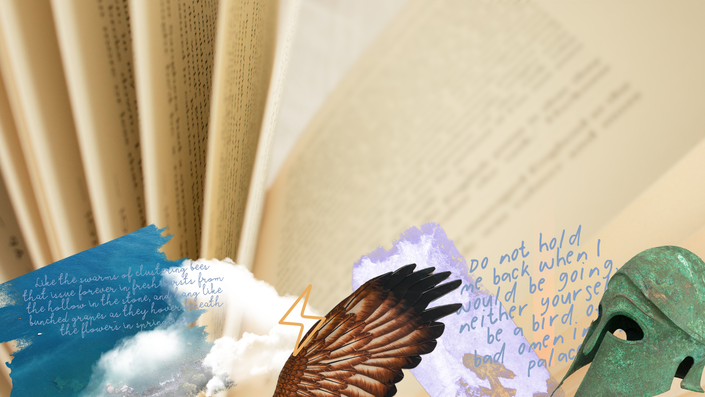COURSE DESCRIPTION
This class will teach high school students about the craft of fiction writing through a study of classic short stories. Students will read 1-2 short stories per week and learn about the elements of a story and techniques of master writers. They will work with sustained attention on one original short story for 4-5 months. The goal is to produce one original short story by the end of Session 2. The full course consists of two sessions which are paid for separately.
COURSE SCHEDULE & LOGISTICS
Course Duration
- 14 weeks
Class Time:
- Tuesdays, 11:30 a.m. - 12:30 p.m. Pacific, 2:30-3:30 p.m. Eastern
Teacher-Student Interaction (Weekly):
- 60 minute live class
- One graded assignment per week with feedback (detailed feedback given in final seven weeks)
- Weekly office hours available by appointment
Class Size:
- 15 student maximum, 5 minimum
Dates: PENDING CANCELLATION
- January 13, 20, 27
- February 3, 10, 17, 24
- March 10, 17, 24
- April 7, 14, 21, 28
- No classes week of March 3 for Spring Break
- No classes week of March 31 for Holy Week
THIS WINTER/SPRING 2026 COURSE WILL LIKELY BE CANCELLED DUE TO LOW ENROLLMENT. IF YOU ARE INTERESTED IN ENROLLING, PLEASE EMAIL MS. FINNIGAN A.S.A.P. We need three more students to launch the class! We'll make sure we have five students before anyone will be asked to pay. The cost of the course will be $449.
Questions? Email
Required Text
The Art of the Short Story
(not included with course)
"A magnificent anthology -- it sets the standard!"
- Emanuel DiPasquale, Middlesex County College

CURRICULUM
Students will read 1-2 short stories each week, take a short quiz, attend one live class, and complete one writing assignment.
Goal of Session 1: Outline your story.
- Learn from the masters: What is a story?
- Engage the imagination.
- Study plot structure.
- Explore your character.
- Experiment with point of view and narrative style.
- Outline your story with a focus on conflict.
Goals of Session 2: Draft your story.
- Be inspired by the masters: What makes for a good story?
- Learn how to build suspense.
- Beautify through imagery and description.
- Revise dialogue for interest and artistry.
- Develop fortitude by drafting the story from beginning to end.
- Discover your theme.

Hi, I'm Ms. Finnigan
I love helping young people nurture their talent and discover a passion for writing!
I have a B.A. in English from Boston College and an M.F.A. in Creative Writing from the University of Montana, where I won the Merriam-Frontier Award for distinguished achievement in writing.
My essays have been published in a wide variety of venues both online and in print, including in an educational anthology called Humor: A Reader for Writers published by Oxford University Press.
I taught a Creative Writing class for eight years at an online school. It was a very popular class. One of the greatest compliments I received from a student: "I had no interest in creative writing but I just wanted to take another class with you, so I signed up. I'm so glad I did because I discovered that I'm actually kind of good at something I never thought I would be good at! I love this class!"
Some of my former students have formed their own writing clubs after graduation. They still "Zoom," critique each other's work, and encourage each other. I love to build trust and camaraderie in the classroom. I hope I can give your student a similar experience!
Student Testimonial
Byron is now 20 years old. He is Founder and Owner of Foxling Studios. You can find his work here!
More Testimonials
I learned a lot about the important aspects of a story: summary versus scene, how to improve my description, how a rising action is supposed to be written, what makes different types of stories, and more!
— Student, April 2024
*
I loved the feedback given on my boys' writing. Very organized and loved how they also had to read good short stories!
— Student, April 2024
*
Detailed feedback given to students with an obvious desire and effort to support their success.
— Anonymous Parent, Spring 2022 Professional Review
*
As to teaching, my son had a wonderful time in Ms. Finnigan's classes. She really inspired him to write, in particular. His writing has really blossomed this year and I believe part of that is down to Ms. Finnigan's encouraging words and affirmation. Going into this year, I expected this class to be a tremendous struggle as neither grammar nor writing are huge favorites. Remarkably, he began to pay closer attention to grammar than ever before and really grew as a young writer. He has always had an interest in storytelling, but his coursework this year really supported him on the path, as well as develop his writing skills further. Thanks so much! Such a blessing!
— Anonymous Parent, Spring 2022 Professional Review
*
From what I could tell, Ms. Finnigan is a very enthusiastic, warm, and engaging instructor. My son really loved his classes with her this year. He always had an extra bounce to his step after class.
— Anonymous Parent, Spring 2022 Professional Review
Note to Parents
Worldview
This class will be mostly "secular," though questions of morality, good and evil, and even the soul will undoubtedly come into play, as they do in all great literature. But this is not a literature class. We'll be focusing on the shape of the stories, the choices the writer made in telling them. I believe this focus on craft over meaning makes it easier for students of different backgrounds to learn together.
All are welcome! But I do not ban discussion of religion in the classroom, especially if it is pertinent (for example, with a writer like Flannery O'Connor, whose religion shapes her moral imagination); but this will not be a major focus of the class and discussions will not "push" a religious message.
At the same time, I, myself, am a Catholic and I am sympathetic to families who choose to homeschool because they want to educate their children in environments that are respectful of their Christian values. Students shall respect each other, and should expect that we will steer clear of controversial "culture war" topics that oppose a Christian worldview. (This shouldn't be a problem. We'll have plenty of other things to discuss!)
I, the teacher, will deem what is and is not appropriate for class discussion, bearing all students in mind.
What will we read?
I select stories that I think are appropriate for high schoolers. I stay away from stories that are written in poor taste, stories with explicitly adult or sexual themes or foul language, as well as "edgy" contemporary stories about social and political issues. I try to select "classics" that have withstood the test of time and are widely recognized as great writing.
However, the great short stories are written by adults for adults, and are sometimes provocative, tragic, or dark. Students in the past have remarked, "Why are short stories so depressing?" This is another reason for the recommended age range. All of this naturally demands more maturity on the part of the students.
Guidelines for Student Writing
Students are welcome to write about anything they want and will have the chance to have their work read by me, the teacher (and eventually by their peers) but they will not be entitled to have their work read by anyone. If a student's writing is offensive to my morals or sensibilities, I, the teacher, have the right to decline to read it. (I am not easily scandalized -- but I do have my limits!) If I suspect it would be inappropriate for other students to read, I may decline to let the work be exchanged, or I may ask to send it to the parents first to obtain permission to have their student read it.
I take things on a case by case basis and try to work with the students. I don't want to punish anyone for their self-expression, but I must be mindful of the other students in the class. Students will be given plenty of notice if I feel their work cannot be workshopped in class, due to its content. Students can make an informed choice whether to continue or change direction.
In ten years of teaching Creative Writing to high school students, I have only had two instances where this kind of problem arose, and each time I was able to work with the student to find an amenable solution. I just want to manage expectations going in.
Thank you for your understanding! If you have any questions or reservations, please feel free to reach out to me for clarification on any of the above.
Your Instructor,
Ms. Finnigan
Alexander Pope wrote "Ode on Solitude," one of his most anthologized poems, when he was only 12 years old.


Langston Hughes wrote "The Negro Speaks of Rivers" when he was only 17.
This is a photo taken when he was in high school.
S.E. Hinton finished writing her novel The Outsiders when she was only 16 years old.

Other Classes
Self-paced and live.






